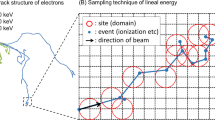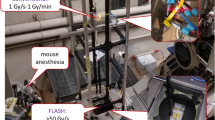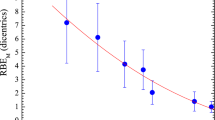Abstract
THE variation of the frequency of chromosomal aberrations as a function of radiation dose-rate has been the subject of numerous experimental investigations, and the results of such studies have been of considerable importance in formulating theories of the basic mechanisms of radiation action1. With the recent availability of radiation sources of great intensity, such as electron linear accelerators, and the development of reliable dosimetric techniques for use at these intensities, the extension of studies on chromosomal breakage into the range of the extremely high dose-rates has become feasible.
This is a preview of subscription content, access via your institution
Access options
Subscribe to this journal
Receive 51 print issues and online access
$199.00 per year
only $3.90 per issue
Buy this article
- Purchase on Springer Link
- Instant access to full article PDF
Prices may be subject to local taxes which are calculated during checkout
Similar content being viewed by others
References
Lea, D. E., “Actions of Radiations on Living Cells”, 2nd edit., 225 (Cambridge Univ. Press).
Boag, J. W., Dolphin, G. W., and Rotblat, J., “Radiation Research” (in the press).
Wolff, S., and Luippold, H. E., Genetics (in the press).
Author information
Authors and Affiliations
Rights and permissions
About this article
Cite this article
KIRBY-SMITH, J., DOLPHIN, G. Chromosome Breakage at High Radiation Dose-Rates. Nature 182, 270–271 (1958). https://doi.org/10.1038/182270a0
Issue Date:
DOI: https://doi.org/10.1038/182270a0
This article is cited by
-
Possible mechanisms and simulation modeling of FLASH radiotherapy
Radiological Physics and Technology (2024)
-
The current status of FLASH particle therapy: a systematic review
Physical and Engineering Sciences in Medicine (2023)
-
Dose rate effect on micronuclei induction in human blood lymphocytes exposed to single pulse and multiple pulses of electrons
Radiation and Environmental Biophysics (2011)
-
Protection Against Acute Effects of Radiation by Hypoxia
Nature (1960)
-
Induced mutation
Euphytica (1959)
Comments
By submitting a comment you agree to abide by our Terms and Community Guidelines. If you find something abusive or that does not comply with our terms or guidelines please flag it as inappropriate.



